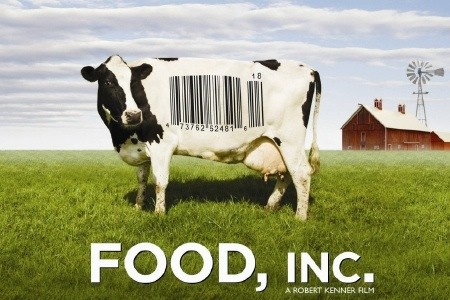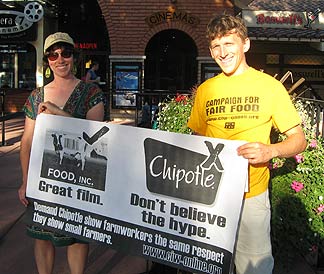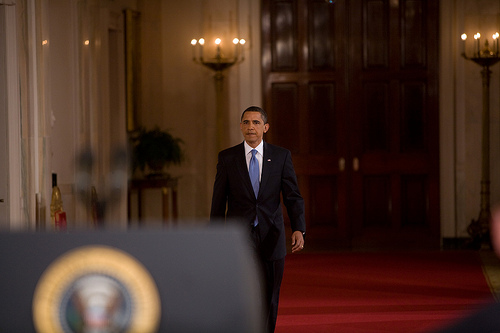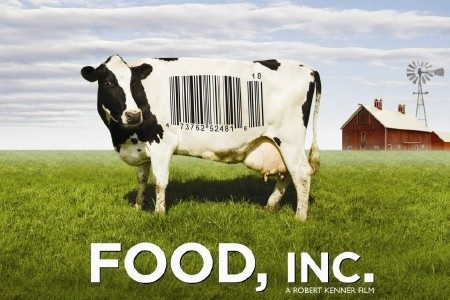
On July 13, Chipotle Mexican Grill announced it was throwing its marketing weight behind Food, Inc., a documentary that takes a highly critical look at the food system.
The fast-food chain would be sponsoring free screenings of the film at 32 theaters nationwide. It would also be distributing material promoting the film at all its restaurants–thus exposing people in search of a tasty burrito to a film quite different from the super-hero blockbusters that get promoted in typical fast-food chains. In addition, there’d be a Chipotle-related “bonus feature” in the film’s upcoming DVD.
The Chipotle/Food, Inc. tie-up caught my eye, because just a month before, a group of food writers and activists signed a letter to Chipotle CEO Steve Ells sharply criticizing the chain for its inaction on farm worker rights. The two signees who topped the list were Food, Inc. director Robert Kenner and co-producer Eric Schlosser, who is also prominently featured in the film. (I signed the letter as well.)
The letter was written on behalf of the Coalition of Immokalee Workers, a farm-worker-led group that has been fighting to improve sub-poverty wages, dismal living conditions, and sometimes outright slavery in Florida tomato country–source of 90 percent of the winter tomatoes consumed in the United States. The CIW wants Chipotle to commit to pay an extra penny per pound for tomatoes, in an arrangement that would ultimately deliver the hike directly to workers. Chipotle claims it supports the penny-per-pound principle, but refuses to sign an agreement with the CIW.
 Off-screen drama at a Food, Inc. showing.“We view the CIW’s struggle for dignity as a non-negotiable part of the struggle for a sustainable food system,” the letter states. “Therefore, we strongly urge you to enter into an agreement with this worker-led organization that has been fighting tirelessly to improve conditions in tomato country since 1993.”
Off-screen drama at a Food, Inc. showing.“We view the CIW’s struggle for dignity as a non-negotiable part of the struggle for a sustainable food system,” the letter states. “Therefore, we strongly urge you to enter into an agreement with this worker-led organization that has been fighting tirelessly to improve conditions in tomato country since 1993.”
When Chipotle announced it was sponsoring Food, Inc., I assumed an agreement with the CIW was imminent. In its uphill fight to get decent wages for tomato pickers, the CIW has won agreements from some of the most profit-focused companies in the food industry, including Burger King, McDonald’s, and Yum Brands, owner of Taco Bell. More recently, two sustainability-minded companies–Whole Foods and Bon Appetit Management–have signed agreements with the CIW. Surely Chipotle, which strives to serve “food with integrity” and has a history of working with mid-sized sustainable farmers, couldn’t be far behind … right?
But then I checked the CIW’s Web site –and it turned out there was just as much distance as ever between the farm-worker group and the burrito chain. (Ironically, the Mission-style burritos served by Chipotle probably evolved from a hearty lunch staple developed for Mexican farm workers in California’s Central Valley in the 1950s.)
I found that activists from a CIW-allied group, the Campaign for Fair Food, had been attending the Chipotle-sponsored free screenings and handing out copies of the letter signed by Kenner and Schlosser. They held up a banner reading “Food, Inc.: great film/Chipotle: Don’t believe the hype.”
Chipotle clearly resents such critical statements at events designed to demonstrate its sustainability cred. At one of its screenings in Denver, Chipotle employees barred people from the Campaign for Fair Food to speak after the screening–overturning an arrangement that had been made with Food, Inc’s public-education campaign.
I asked Chipotle communications director Chris Arnold about the incident. He referred me to Matt Cowal of Magnolia Pictures, which is distributing the film. “What happened with the Campaign for Fair Food was a mixup,” he told me. “The Chipotle screenings and what we’re doing with our social-action partnerships were always meant to be separate initiatives. Chipotle was under the correct impression that their screening was intended to be exclusively for their guests and what happened was a scheduling error on our part.”
In other words, people wanting to discuss the CIW issue aren’t to be given stage time at the Chipotle-sponsored Food, Inc. screenings. Damara Luce of Just Harvest USA tells me that after the Denver screenings, Chipotle representatives were equally inhospitable to CIW allies at showings in Kansas City, Washington, D.C., and Baltimore.
So what gives? How did a film made by Kenner and Schlosser end up being sponsored by a company being called out by Kenner and Schlosser? I contacted all the principal actors in this drama to find answers.
 Food, Inc. director Robert Kenner
Food, Inc. director Robert Kenner
Standing with the farm workers
Schlosser and Kenner, for their part, stand by their support of the Coalition of Immokalee Workers. As the film’s co-producer and director, they have limited say over how it’s marketed and distributed. Those decisions ultimately lie with the film’s production company, Participant Media, and its distributor, Magnolia Pictures.
Participant declined to comment for this article. Cowal of Magnolia Pictures told me he was unaware of the situation in Florida’s tomato fields when he linked up with Chipotle, which he called a leading player in the movement to reform the food system. “They’re doing a lot of great things around sustainability,” he said. He added: “We do hope something positive will come of this–that it [the controversy] will inspire Chipotle to rethink their position on the Coalition.”
As for Schlosser and Kenner, as you might expect from writer/filmmaker types, they have strong opinions. Schlosser wrote the following in an email:
I like the food at Chipotle. I think their efforts on behalf of sustainability, animal welfare, and the misuse of antibiotics are terrific. But I care more about human rights than any of those things.
If Taco Bell, Subway, Burger King, and McDonald’s can reach agreement with the CIW, I don’t see why Chipotle can’t. It will not cost much–and it will help to end human trafficking in Florida.
Although I’m grateful for the support that Chipotle has given to Food, Inc., my views haven’t changed since I signed that letter.
Kenner took a similar position in a phone conversation. He said he admires Chipotle’s commitment to sustainability–in fact, he seriously considered featuring it in Food, Inc. as an example of a large player that’s “moving in the right direction.” “I don’t regret that they’re sponsoring the film,” he emphasized.
But he made clear that he disagreed with the company’s position on the CIW. “The film is really about fair food,” he said. “People are aware that animals are being abused [in the food system]. There’s a lot less consciousness about workers.”
In fact, just as Kenner nearly included a section on Chipotle, he also seriously considered honing in on the situation in Immokalee. If the film hadn’t ended up shining a light on harsh working conditions in the pork-proccessing industry, “we would have gone to Immokalee and told that story.”
“I was hopeful that by associating itself with a film that promotes workers’ rights, [Chipotle] might be inclined to sign with the Coalition,” he said. “And now I’m not confident they will.”
He repeated: “Frankly, I don’t understand their position.”
In the heat of the grill
So what exactly is Chipotle’s position on Florida’s ruthlessly exploited tomato-field workers? (I visited Immokalee myself last spring, and filed two reports–here and here.)
First, a little setup. Florida’s tomato pickers are currently locked in a battle with the area’s farm owners over the penny-per-pound raise the CIW wrung out of McDonald’s, Burger King, and Yum Brands. The Florida Tomato Growers Exchange is refusing to pass on the raise to workers, whose real wages have plunged to well below poverty level in the past two decades. So the CIW is locked in a bitter fight with the Growers Exchange.
Whole Foods and Bon Appetit recently intervened by signing on to the CIW’s penny-per-pound pledge, while also working with the Coalition to identify sustainable tomato growers who pay their workers decently. Chipotle has chosen to chart its own path–it has set up its own escrow account to hold an extra penny-per-pound for workers. And, like the CIW, it claims to be looking for growers willing to pass it on.
“We are escrowing a penny per pound for any tomatoes we buy from Florida, with that money earmarked for the farm workers,” Chipotle’s Arnold wrote in an email message. He continued:
But we would rather have that money get to the workers rather than simply amassing in an escrow account. That is why we are working (with assistance from the CIW) to try to find growers who will actually pay the additional money to the workers, rather than support the Florida Tomato Growers Exchange in blocking payments to the workers.
That last bit doesn’t make any sense to me. If they want to help break through the Growers Exchange and get the workers their much-needed raise, why not join McDonald’s. Burger King, Whole Foods, etc, and work hand-in-hand with the CIW?
I asked CIW staffer Greg Asbed about the situation. Why aren’t Chipotle’s efforts sufficient? “Chipotle has made no commitment, signed no enforceable agreement, behind their decision to pay the penny per pound.” he wrote in an email. He added:
All our agreements, from Yum Brands to Bon Appetit, are signed, enforceable agreements with no fixed term for the penny per pound– and so the agreement to pay the surcharge is not dependent on the whim of the company. Chipotle, on the other hand, could rescind its decision to pay the penny more tomorrow (even assuming they are really paying it today) and we would have no recourse but to protest.
Asbed also points out a stark contrast in Chipotle CEO Steven Ells’s approach to food issues. “Ells is clearly, for whatever reason known only to him, far more comfortable walking arm in arm with a small farmer than embracing farmworkers leading the fight for human rights in the fields,” Asbed wrote. “And that disparity, that contradiction, is what is so very wrong about Chipotle and its efforts to position itself at the forefront of the sustainable food movement.”
Ironically, by embracing Food, Inc., Chipotle is highlighting the whole vexed issue of how America treats the people who harvest and prepare its food–which is exactly what Kenner intended the film to do in the first place.



